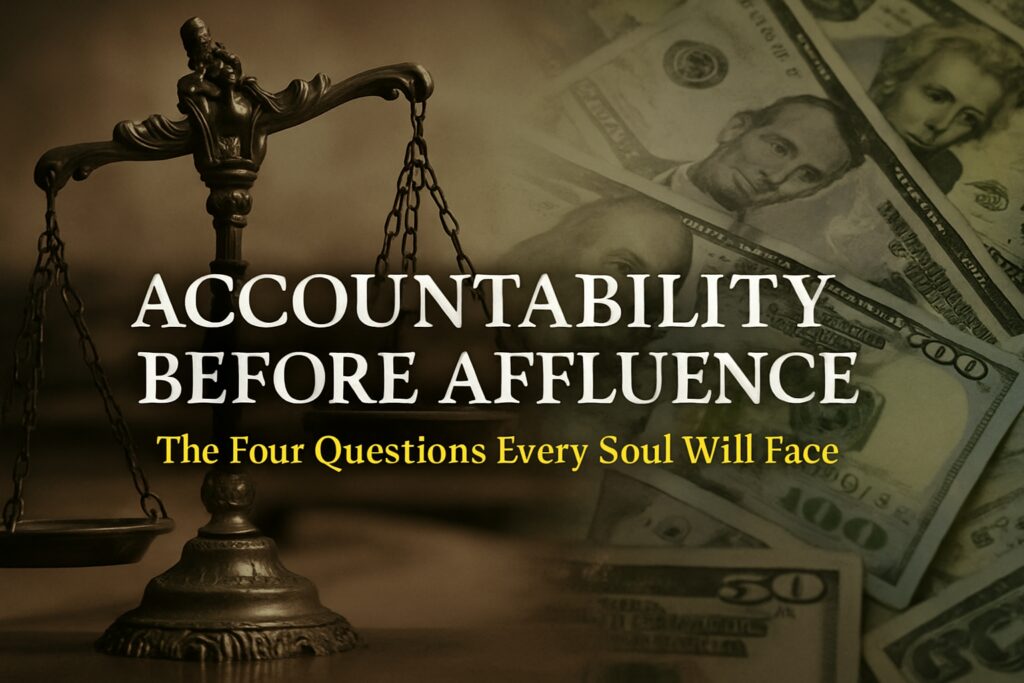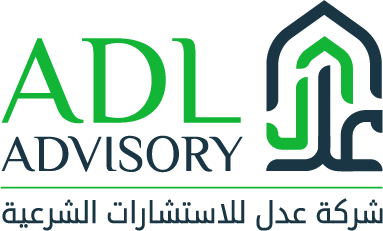
Accountability Before Affluence: The Four Questions Every Soul Will Face
From the Islamic worldview, wealth is not a private right but a divine trust, an amanah entrusted by Allah to whom He wills, as He wills, for however long He wills. It is neither a badge of honor nor a measure of worth. Rather, it is a test — a means of elevation or destruction — depending on how it is acquired and where it is spent.
The Messenger of Allah ﷺ said:
” لاَ تَزُولُ قَدَمَا عَبْدٍ يَوْمَ الْقِيَامَةِ حَتَّى يُسْأَلَ عَنْ عُمْرِهِ فِيمَا أَفْنَاهُ وَعَنْ عِلْمِهِ فِيمَا فَعَلَ وَعَنْ مَالِهِ مِنْ أَيْنَ اكْتَسَبَهُ وَفِيمَا أَنْفَقَهُ وَعَنْ جِسْمِهِ فِيمَا أَبْلاَهُ ” (الترمذي)
“The feet of the slave of Allah shall not move [on the Day of Judgement] until he is asked about five things: about his life and what he did with it, about his knowledge and what he did with it, about his wealth and how he earned it and where he spent it on, about his body and for what did he wear it out.” (Tirmidhi, 2417)
This prophetic narration outlines the sad reality that we will all face ultimate accountability before Allah ﷻ. And the central to that reckoning is wealth, not just about how much of it we had, but how it entered our hands and how it left.
Let us explore these four questions and their implications, especially the two dealing with financial ethics and responsibility.
- Our Life: How Did We Spend It?
Every breath we take is a tick towards the grave. The Quran reminds us, “أَوَلَمْ نُعَمِّرْكُم مَّا يَتَذَكَّرُ فِيهِ مَن تَذَكَّرَ”
“Did We not give you lives long enough for whoever would remember to remember therein?” (Quran, 35:37). Life, in Islam, is not to be survived; it is to be invested in worship, service, growth, and striving for one’s Akhirah. The daily routines we do, such as working, studying, parenting, all become means of reward when aligned with sincerity and God-consciousness.
- Our Youth: How Did We Use It?
Why single out youth, when it’s part of life already? Because youth is unique, marked by energy, passion, boldness, and possibility. The choices we usually make at that chapter of our life often set the tone for the rest of our journey. The Hadith identifies the youth who worship Allah as one of the seven shaded under the Throne of Allah on Judgment Day (Bukhari & Muslim).
From a financial lens, it is often in youth that spending habits are formed, careers are chosen, and ethical compasses are set. The seeds of financial consciousness and moral integrity are planted early.
- Our Wealth: How Did We Earn It?
This question penetrates the heart of Islamic financial ethics. In the modern capitalist world, wealth is often pursued without question. The “how” seems irrelevant and overlooked as long as the bank account grows. Islam categorically rejects this.
As we know, in Shariah, sources of income must be halal (permissible), free from riba (interest), fraud, deception, gambling, exploitation, or the sale of haram products and services.
Indeed, Islamic scholars emphasize that no act of worship — not prayer, not charity, not even Hajj — is accepted from earnings tainted by haram.
In short, the question is not how much we made, but rather, how you made it.
- Our Wealth: How Did We Spend It?
Spending is not merely a private choice; it’s a moral act. The Quran over and over commands believers to spend “out of what We have provided for them” (Quran, 2:3). This highlights that what we own is not truly ours.
Islam encourages moderation (wasatiyyah) in spending. Not stinginess, not extravagance, just balance. Allah describes the ‘Ibad al-Rahman, the servants of the Most Merciful, as:
وَٱلَّذِينَ إِذَآ أَنفَقُوا۟ لَمْ يُسْرِفُوا۟ وَلَمْ يَقْتُرُوا۟ وَكَانَ بَيْنَ ذَٰلِكَ قَوَامًۭا
“Those who, when they spend, are neither extravagant nor miserly, but hold a medium (way) between those extremes.” (Quran, 25:67)
It is reported that the Prophet ﷺ said: “Eat, give charity, and wear clothes without extravagance or pride.” (𝘕𝘢𝘴𝘢’𝘪)
Hence, the spending question does not only refer to haram spending, but even halal spending done irresponsibly, with ego, vanity, and heedlessness.
The wealth we spend on our families, charity, and social upliftment becomes a sadaqah jariyah, a continuous charity. But wealth wasted on arrogance and fleeting pleasures becomes a burden in the balance sheet of the soul.
The Weight of the Question
These four questions are not rhetorical. We should not take them for granted, they are real, and we will all face them.
Contemporary Muslims, especially those navigating careers in finance, business, or commerce, must carry this Hadith as a moral compass. In today’s world of endless transactions, credit cards, advertising, and financial complexity, we must pause to ask: Am I earning in a way pleasing to Allah? Am I spending in a way pleasing to Allah?
Conclusion:
Wealth is not evil, nor is poverty inherently virtuous. Islam is not anti-wealth. In fact, many of the Prophet’s companions, Abu Bakr, Uthman, Abdurrahman ibn Awf — were wealthy merchants. But their hearts remained detached from their wealth. They saw themselves not as owners, but as trustees.
As believers, we must learn to view our bank accounts, assets, businesses, and income not as trophies, but as tools. Tools to serve the Ummah. Tools to uplift the weak. Tools to purify our souls.
On that day when the books are opened and every penny is tracked, the one who earned and spent mindfully will rejoice. As for the one who turned wealth into a god, the Quran says:
“Your wealth and your children will not benefit you on the Day of Judgment — only he who comes to Allah with a sound heart.” (Quran, 26:88–89)
References:
- Tirmidhi, Hadith 2417
- Qur’an, 2:3; 25:67; 26:88–89; 35:37
- Sahih Bukhari & Sahih Muslim – Hadith of the shaded youth
